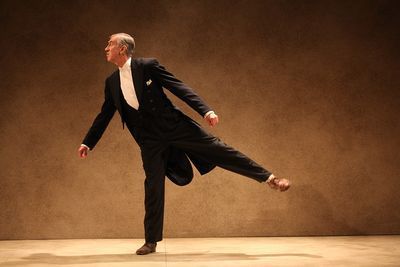Sam-think for the weekend
Barry McGovern in Watt at the Barbican
By THEA LENARDUZZI
A man walks on stage in a greyish trench coat, tied at the waist, with a
grubby-looking block hat. He is carrying two intriguingly small leather cases – just room enough for, say, a week’s worth of socks and underwear and, at a
push, a change of shirt. This is Sam who, though he does not make an entrance
in Beckett’s novel Watt until the
third section of the narrative, takes centre stage in Barry McGovern’s stage
distillation, part of the Barbican’s Dancing around Duchamp season.
Sam is now Part One. There is only one. He is the One. This is
a monologue. Having shed his outerwear to reveal an old-fashioned butler’s
uniform, Sam thinks back to Watt and of how Watt came to be in the house of their
Master, Mr Knott. And of how Watt moved within the establishment once he was
there, and then of how he came to depart from the Knott place.
Watt is curious, about the house and the order of people and things, but
not too much. When he first arrives (for we find ourselves, as Sam goes through
the motions, transported back to the present tense, in a sense), he sits and watches the
embers in the grate. Sam/Watt narrates: “Watt saw in the grate, of the range,
the ashes grey. But they turned pale red, when he covered the lamp, with his
hat . . . . So Watt busied himself a little while, covering the lamp, less and less,
more and more, with his hat, watching the ashes greyen, redden, greyen, redden,
in the grate, of the range.”
One of the strengths of McGovern’s performance is that, in hearing the
text spoken aloud, its poetry is revived, and it resonates. As does the humour.
Watching McGovern is like watching Tommy Cooper – he might as well have smoothed
down his suit and asked “do you like my tails?”, before proffering two scraps of
animal hide. But, with the trench, hat and cases arranged on a hat-stand in the
half-light up stage, this is more like the Morecambe and Wise show – with a
brief moment of Fred Astaire, when demonstrating Watt’s peculiar “way of
advancing” (pictured above).
More comes of this exercise (and Beckett himself
referred to his novel as such) than one might otherwise wish of an hour in the
dark with a stranger. At any one point someone in the audience is tittering,
snorting or all-out laughing; you could call it a laugh-a-minute performance
which, for a fifty-minute monologue, is no small achievement.
But it’s not all absurd name-games. By bringing Sam to the fore,
McGovern focuses our attention on Sam, and on Sam’s think(ing). Sam’s think –
let’s call it “Sam-think”, with the same local pronunciation that, our narrator
explains, turns “third or fourth” to “turd or fart” – is, of course (of
course!) the opposite to no-think. Which is, well, who knows Watt. But Sam-think
comes of Watt and his journey to, and through, the house.
“Personally, of course”, Sam
explains, “I regret everything. Not a word, not a deed, not a thought, not a
need, not a grief, not a joy, not a girl, not a boy, not a doubt, not a trust,
not a scorn, not a lust, not a hope, not a fear, not a smile, not a tear, not a
name, not a face, no time, no place, that I do not regret, exceedingly. An
ordure, from beginning to end . . . ”. He goes on: “And the poor old lousy old earth,
my earth and my father’s and my mother’s”, culminating in – and at this point
I’m sure I heard someone stamping a foot with glee – “and fathers’ fathers’
mothers and mothers’ mothers’ fathers’ and fathers’ fathers’ fathers’ and
mothers’ mothers’ mothers’.”
There is more, too, than this frenzied, almost hypnotic, repetition of
words and passages. On Sam's/Watt’s arrival at the station, having departed
Knott’s house, he asks for a ticket “to the end of the line”. “Which end”,
comes the response, “the round end or the square end?” (there is something in this for
scholars of Woolfian temporal perception – the cyclical rhythm, the repetition – perhaps. What?). “The further end”, comes Watt’s solemn answer.
No wonder Sam regrets it all. The cases he carries are heavy with Watt, with
the memory of Watt, and what had happened (although “nothing had happened, with
all the clarity and solidity of something”), and his – their – search for
meaning. “No symbols where none
intended” – the novel’s final line – but that’s an awful lot to carry around
with you, isn’t it?
Watt runs until March 16. The Barbican's Dancing around Duchamp season will be reviewed in a future edition of the TLS.
Peter Stothard's Blog
- Peter Stothard's profile
- 30 followers




